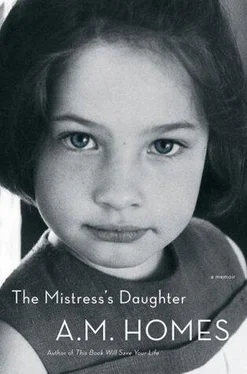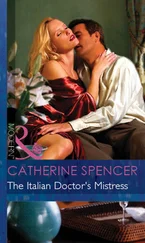And now, again, it is Christmas. Waking up in the twin bed of my childhood, I do not jump up and hurry into the living room to see what Santa has brought me. I lie there thinking, it is only one day, there is no reason that today has to be so awful, so different from any other day. I take a breath and tell myself I will make it good.
The telephone rings. I hear my mother in the kitchen, answering it. She calls my name.
“How are you? I just wanted to wish you a wonderful Christmas. What are you up to today?” Norman asks.
“Nothing,” I say.
I don’t think he believes me.
“I’m just getting ready to go to church with the family. Just on my way out but I wanted to say hello. Ho ho ho.”
There is a pause.
“Have you heard from the Dragon Lady?”
“She’s with friends in Atlantic City; they’re going to a show at one of the casinos, Wayne Newton or something.”
“Fine thing,” he says.
“Isn’t it?” I say.
“Listen, I don’t know how long you’re in town…I’m not going to be able to get together today, but maybe later in the week, if you’re still around, we can meet.”
“I’m not sure,” I say, thinking that at any minute I’ll spontaneously combust and leave a smoldering heap of ashes on the floor for my mother to suck up with her Electrolux wand.
“Well, listen, you have a nice day and we’ll talk soon.”
“Yeah, you too. Merry Christmas.” I hang up. Norman the good Christian is off to church, leaving his “other” daughter trapped like some Cinderella in the house without holidays.
I go into the kitchen. “Are you all right?” my mother asks.
“Fine,” I say, slamming the refrigerator. “I’m perfectly fine.”
“Do you want a bagel?”
I am picturing roasted turkeys, hams, a large luxurious dinner — too much pie.
“What does ham taste like?”
“It’s good,” my mother says.
“Why don’t we ever have ham?”
“Your father doesn’t really like meat — he thinks he’s a vegetarian.”
Despite my thinking I will make it a decent day, I cave in. Norman is going to church with his family and then having Christmas dinner, and they have a fucking Christmas tree. I know because late last night I drove by the house, and I saw the driveway filled with cars, a wreath on the door, a thousand lights inside.
In the afternoon, my mother does the winter equivalent of spring cleaning — she is on a stepladder in the closet. “Does any of this mean anything to you?” She shows me an old frying pan, a cookie tin, a chipped plate.
“No.”
“I’m thinking of going to a movie,” I say.
“Do you think you’ll get in?” my mother asks.
My father is in the living room reading. “What are you thinking of seeing?
“ Schindler’s List .”
“I read a review that was negative,” my father says.
“Bye. Have fun,” my mother says.
“It’s not supposed to be fun. That’s why I’m going.”
I grew up convinced that every family was better than mine. I grew up watching other families in awe, hardly able to bear the sensations, the nearly pornographic pleasure of witnessing such small intimacies. I would hover on the edge, knowing that however much they include you — invite you to dinner, take you on family trips — you are never official, you are always the “friend,” the first one left behind.
The movie theater is crowded with families, with couples, young and old. I find a single seat in the middle of a row — everyone rises to let me pass. I’m sitting in the theater by myself, distinctly aware that I do not want to spend the rest of my life alone, frightened that I will never be able to make a life, that I am too fractured to connect with another person.
The film, taken from a novel by Thomas Keneally, is based on the true story of Oskar Schindler, a German businessman, a Nazi, a womanizer, who ultimately turned around and saved the lives of eleven hundred Jews. I watch thinking of Norman, Norman as Schindler — German, Catholic, charismatic, charming, struggling with right versus wrong. I watch prison camp commandant Goeth, who shoots Jews for target practice, thinking of the randomness, the unpredictability, of history. Even those who seem decent or even perhaps heroic aren’t; instead they are human, deeply flawed. It is about the degradation of the soul, struggling to maintain some small sense of self amid so much loss, struggling to maintain oneself in a death camp, to remain human, alive, even in death. It is the Christians versus the Jews, the dividing of families, oddly relevant.
If Norman were truly the big guy, the good Christian he pretends to be, he would accept responsibility. He would tell his children that there had been a lapse in the marriage, but that something good had come of it — me.
On all sides of me people are weeping, and yet I am finding the film uplifting — it is equal to what I am feeling.
I drive home. The lights are on; I am in front of the house, the only house we ever lived in, in front of my family. I pull into the carport. I am so angry, so sad, hating everyone for who they are and for everything they are not. It is the rising of emotion, as everything I can’t articulate begins whirling inside me. I gun the engine. I imagine driving the car into the house, crashing through, desperate to get past what is blocking me. I am gunning the engine, wishing I’d take my foot off the brake; the car is straining under my foot. The car, a brainless machine, wants to go forward, to hurl itself blindly through the wall and into the kitchen. I picture the cabinets emptying out, dishes breaking, the engine punching through the back of the refrigerator, a headlight coming through the crisper door. I hope the dog isn’t in the kitchen, that no one has gone in for a snack. I sit with my foot on the gas, wanting to do it, and then thinking about my mother and my mother’s dishes, how much she loves her dishes, how much I love my mother, how I wouldn’t want to break the dishes and how it wouldn’t be quite the same if I went into the house first and emptied all the shelves and then came back out again and went crashing through.
I pull up outside the house and I don’t want to go home. There is no home, there is no relief, no sense of having simply survived.
Christmas is almost over. I do not want this to be the most depressing story ever told. I turn off the engine. I wait.
In January 1994, just after the new year, Ellen calls and asks, “When will you see me?”
I say, “Saturday.”
She is shocked. So am I. I’m not sure why I say Saturday; but in some way it feels inevitable. How much longer can it go on: When will you see me? Why won’t you see me? We need to meet in an agreed-upon way — and not in a kamikaze attack like the scene in the bookstore. There is no good time, no right time. I am repelled and I am also curious.
I say Saturday and immediately regret it.
She gets too excited. “Where will we meet? What will we do?” Ellen envisions the meeting as a fun-filled-day-in-New-York package — horse-drawn carriages, ice cream sodas, going to a show (by this she means a musical).
I’m thinking an hour, maybe two. I’m thinking a little bit will go a long way.
“Let’s meet at the Plaza,” she says. “At the Oyster Bar.”
The Plaza is a part of the fantasy — home of Eloise, four o’clock tea, a tourist attraction. The last time I was there, Zsa Zsa Gabor was in the lobby talking the man at the candy store into giving her free chocolates.
“Will you let her kiss you hello?” a friend asks.
“I don’t think so,” I say and then feel bad. “If she wants to kiss my hand, she can.”
All of the books on adoption and reunion say to arrange for someone to meet you after the reunion for a kind of deprogramming session, to pick up the pieces. I call a friend, a woman with children and grandchildren of her own, and arrange for her to meet me in the Oak Bar at 6 P.M. I tell her that if I’m not there, she’s supposed to come into the Oyster Bar and get me. This is in case the mother tries to somehow detain me, to put me under her spell, in case I lose my free will and have to be plucked from my mother’s clutches.
Читать дальше












